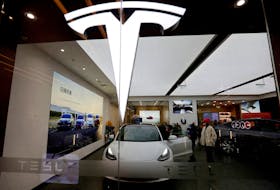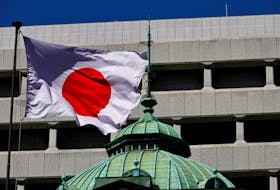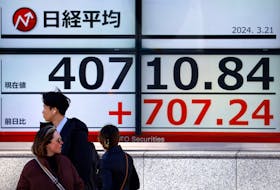By Twinnie Siu and Donny Kwok
HONG KONG (Reuters) - Hong Kong's economy grew at its slowest annual pace in nearly 10 years in the first quarter, an advance government estimate showed on Thursday, hit by a slowdown in exports and investment.
The Asian financial center has been buffeted by China's slowing economy and the U.S.-China trade war, along with cooling property prices and volatile stock markets.
The economy grew 0.5 percent in the January-March quarter from a year earlier, the weakest increase since the third quarter of 2009, compared with a revised 1.2 percent pace of growth in the final quarter of 2018.
This was the first time the government has released a preliminary reading on gross domestic product (GDP).
On a quarterly basis, the economy expanded a seasonally adjusted 1.2 percent after contracting a revised 0.5 percent in the fourth quarter.
"Total exports of goods weakened further in the first quarter, similar to the situation in many other Asian economies," a government spokesman said in a statement. "Exports of services also recorded decelerated growth, yet sustained expansion of inbound tourism continued to provide support."
Private consumption grew marginally and overall investment expenditure contracted as business sentiment had turned cautious since the latter part of 2018, the spokesman said.
WORST MAY BE OVER
Paul Tang, chief economist of Bank of East Asia, said the economy looked set to improve in the near future thanks to the positive wealth effect from stronger stock and property markets.
"We are quite sure the performance in the first quarter is the worse, and a recovery in the second half will become more obvious," Tang said, adding that positive signs in Sino-U.S. trade talks and a stabilizing Chinese economy were lending support to business confidence.
Hong Kong's Financial Secretary Paul Chan said on his blog on Sunday that first-quarter growth would be modest on a year-on-year basis and would be much lower than the fourth quarter amid increased uncertainties in the political and economic environment. (https://bit.ly/2DKzjKy)
In February, Chan forecast the city's economy would expand 2-3 percent this year, compared with 3 percent in 2018. He also predicted growth would average 3 percent from 2020-2023.
Though the coastal city's share of China's trade has declined with the rise of mega-ports on the mainland, its open economy remains highly vulnerable to external risks. In addition to trade, it is highly reliant on tourists and investment flows from China.
"If the trade issues could be resolved to some extent and part or all of the tariffs previously imposed could be lifted, global economic sentiment will be boosted, facilitating the growth of Hong Kong's economy," Chan said.
The United States and China are nearing a trade deal that would roll back a portion of the $250 billion in U.S. tariffs on Chinese goods, Politico reported on Wednesday after U.S. Treasury Secretary Steven Mnuchin said the two countries completed "productive" talks in Beijing.
As for China's economy, it is starting to show some signs of bottoming out in response to stimulus measures, but analysts say it is too early to call a turnaround.
While conditions are expected to stabilize around mid-year, economists caution that China is unlikely to see a sharp rebound as in the past, noting Beijing's stimulus measures so far have been relatively more restrained. That would mean more subdued recoveries in Hong Kong and other trade-reliant Asian economies.
Hong Kong will release first-quarter data and its latest economic forecasts for the year on May 17.
(Editing by Jacqueline Wong)









